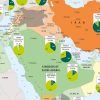
With global attention focused on other hotspots of conflict and tension in the Arab and Muslim world, Tunisia has had very little press over the last seven years, with a few reports referring to it as the last glimmer of hope of what was so hastily dubbed the ‘Arab Spring’ or as a target of jihadism. But, in addition to being the North African country with the largest number of nationals joining the ranks of ISIS, Tunisia is still a long way from having consolidated its transition towards a system that fully satisfies the demands and expectations of its over 11 million inhabitants.
It comes as little surprise therefore that, since the beginning of the year, its citizens have been taking to the streets again in protest. The festive spirit with which 14 January, the anniversary of the fall of the Ben Ali regime, was once celebrated is now gone and forgotten, and the gradual rise in the discontent expressed on the occasion has recently culminated with the emergence of the Fech Nestannew (What Are We Waiting For?) movement, which has become the spearhead, still vague in its profile, of the frustration expressed by a young population faced with a sharp deterioration in its living standards.
The most immediate trigger for what is happening now is the approval of the 2018 budget, establishing new cuts in the assistance and subsidies for the most disadvantaged, coupled with a significant rise in prices and taxes.
At the root of these measures are the serious economic problems generated as much by the inherent corruption and inefficiencies as by the impact of the violence deterring tourism and foreign investment.
In a bid to reverse the negative trends in an economy failing to create sufficient employment (the rate of unemployment among graduates is above 30 per cent), the country has had to turn to the International Monetary Fund, which, in 2016, approved a credit line of around US$2.8 billion over four years, tied to reforms requiring a large dose of all-too-familiar austerity.
If we add to this the growing perception that the political class, caught up in infighting with the approach of the municipal elections set for May, does not represent the interests of the majority, the scenario being created promises nothing but heightened tension and repression. The government, led by Youssef Chahed, has shown no hesitation in its use of force, even placing the army back on the streets. One demonstrator has already been killed and over 800 have been arrested.
Everything would indicate that the government – Ennahda and Nidaa Tounes – and the opposition – led by the Popular Front – are progressively being viewed as oblivious and insensitive to the plight of ordinary Tunisians, who they have been quick to tag as fanatics or even assassins for voicing their discontent. The heavy legacy of the former regime is still perceptible in many of the new leaders, and there have already been nine governments since the fall of Ben Ali.
The prospect cannot, however, be ruled out of President Chahed making a purely tactical move and deciding to alter some of the most unpopular aspects of the budgets approved, in a bid to neutralise a movement that has no clear leadership and has not managed to mobilise as many Tunisians as seven years ago, when they took to the streets to free themselves of the dictator.
But even if this were to happen, with measures such as those adopted on Saturday 13 January, approving little more than €23 million in assistance for the most needy, the underlying problems will remain, characterised by a situation whereby, regardless of their efforts, Tunisians cannot do enough to drag the country out of the tunnel it has been stuck in for many years. It is something the European Union and other outside actors have not seemed to grasp, given their miserliness in the bid for a stable and developed Tunisia.
Tunisia has a significant number of assets that could help it to find its place among the democratic states where security and wellbeing are strong hallmarks of their identity.
It has managed to improve its level of security, bearing in mind that the last violent attacks date back to March 2016. It has also shown its capacity for negotiation and agreement, as illustrated by the approval of a constitution without parallel in the region. Women’s associations and the rest of the civil society landscape constitute highly significant assets when it comes to explaining the country’s overriding capacity to reach understandings and find peaceful solutions to disputes.
And, finally, there has even been some improvement in the economic variables, although it has to be said that the benefits have not been felt by broad sections of the population, which are once again suffering from the renewed rise in inflation (6.4 per cent in December 2017).
If only 14 January could only be remembered for the suspension of all football matches and for the launch of a process seeking to re-establish the social contract.
This post was translated and updated by Equal Times.


